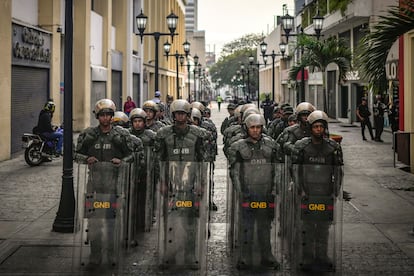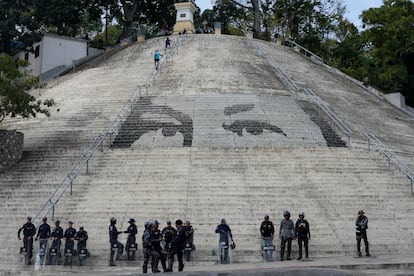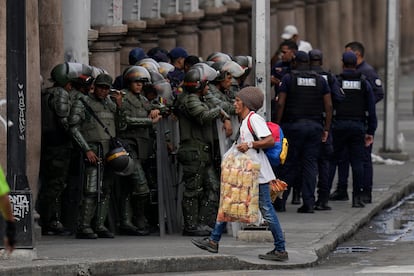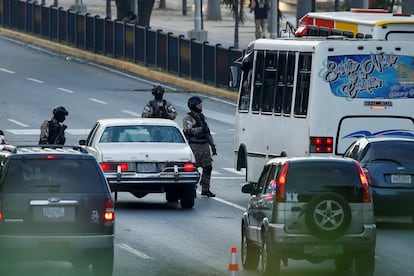Chavismo reinforces police and military presence in the streets of Caracas
President Nicolás Maduro has practically sealed off the capital against Edmundo González’s intention to take office on Friday as the next president of Venezuela

The images of the last week in Venezuela have become a familiar landscape: uniformed soldiers dressed for combat at the door of a government building, inspections with dogs of cars crossing the toll booths of the main highways, searches in the subway, on buses, on every street corner. Chavismo’s Big Brother has deployed all its presence ahead of the inauguration on Friday, when a president will be sworn into office in Venezuela. That is the factual data; what will happen exactly remains to be seen. The current president, Nicolás Maduro, has put the entire state apparatus to work for him in order to retain power for another six years, despite the more than unfounded suspicions that he committed electoral fraud on July 28, snatching victory from Edmundo González Urrutia, the opposition candidate who on Monday met with Joe Biden, the outgoing president of the United States, in the White House. González wants the United States to help him achieve the restoration of “democratic order” in Venezuela.
This enormous tension is being answered by the Chavistas with a display of weapons. In Caracas, on its outskirts and on the main roads of the country, the military and police presence has multiplied in recent days, although it was already a regular sight since the authorities repressed the protests against Maduro’s claims of election victory, which he made with support from the National Electoral Council and the Supreme Court, two bodies under the official wing. Maduro regularly gathers his militants at small rallies, and offers televised addresses almost every day, defending the constitutional legality of his government, often accompanied by the country’s military hierarchy and representatives of the public powers, almost all of them members of the PSUV, the official party.
Maduro always tries to give the impression that he has complete control over the government. The Chavista bureaucratic apparatus claims that this demonstration of firepower is due to its interest in guaranteeing the safety of the international leaders who will attend the inauguration. In the opposition, Edmundo González, who has been living in exile in Spain since shortly after the election, insists that he will return to Venezuela “by any means” to enforce the result of the polls. This Monday, Maduro held a meeting with the high political-military command at Miraflores Palace, the government residence. “The psychological wars they are mounting don’t hurt us one little bit (...) not one little bit,” he said.
The presence of police and military officials in Caracas is particularly visible in the Libertador Municipality, the largest and most important of the five that make up the metropolitan area, seat of the city center and the headquarters of its public powers. The surroundings of the Miraflores Palace, seat of government, and the Federal Legislative Palace, seat of parliament, are occupied. Universidad and Urdaneta Avenues, key roads in the city center, were overflowing with personnel, especially from the General Directorate of Military Counterintelligence. On Andrés Bello Avenue, and in residential areas such as La Candelaria, El Bosque, Maripérez and San Bernardino, there were pickets of the Bolivarian National Police and the National Guard.

Towards the east of the city, in the municipalities of Chacao, Baruta and El Hatillo, home to many middle-class areas, police pickets are less common. Instead it is common to see rounds of “strategic patrols” by the Bolivarian Intelligence Service, the political police of Chavismo.
The Caracas-La Guaira highway, which connects the capital to the airport and the sea, has been closed for maintenance work. In the southwest, at the Tazón exit, on the way to cities such as Maracay and Valencia, DGCIM officials were recently carrying out a thorough check of passengers at the toll booth, which, according to reports, generated long traffic lines.
The policy of increasing the number of police officers on patrol in these days of pre-election tension has been acknowledged and defended quite openly by Diosdado Cabello, Minister of the Interior and Justice, who has spent a significant part of his time working politically to win the affection of the country’s police forces.
“We are patrolling, as part of our duty, to bring peace to the country, to guarantee peace,” Cabello said in a video in which he himself is seen driving a police car in downtown Caracas. “Some in the opposition are nervous because there are security measures in place. That is very normal on such an important date as the inauguration. In these procedures, our colleagues from the security forces are doing what is required of public order.”

The presence of the military is being discussed in the streets in hushed tones and with amazement. It is common for people to exchange tips on how to avoid police checkpoints. “I think they are scared,” says Yovani Morales, who works as a self-employed electrician and plumber. His opinion is one of the most repeated comments these days in the streets.
Edmundo González has sent a strong message through a video to the Armed Forces at this delicate political moment, as did María Corina Machado, the leader of the opposition, recently. “In these defining moments, I address you with the certainty that, together, we will overcome the challenges we face as an institution and as a nation. This January 10, by the sovereign will of the Venezuelan people, I must assume my responsibility as Commander-in-Chief of the Armed Forces, with the responsibility of directing our efforts towards a future of well-being and prosperity.”
The message was described as “farcical and ridiculous” by Vladimir Padrino López, Minister of Defense, General-in-Chief of the Armed Forces and a key figure in the architecture of power of Chavismo. Padrino addressed the nation on national television accompanied by the High Military Command to offer a new proof of loyalty to Nicolás Maduro and the political project of the Bolivarian revolution, regardless of what the votes and the polls say.

Sign up for our weekly newsletter to get more English-language news coverage from EL PAÍS USA Edition
Tu suscripción se está usando en otro dispositivo
¿Quieres añadir otro usuario a tu suscripción?
Si continúas leyendo en este dispositivo, no se podrá leer en el otro.
FlechaTu suscripción se está usando en otro dispositivo y solo puedes acceder a EL PAÍS desde un dispositivo a la vez.
Si quieres compartir tu cuenta, cambia tu suscripción a la modalidad Premium, así podrás añadir otro usuario. Cada uno accederá con su propia cuenta de email, lo que os permitirá personalizar vuestra experiencia en EL PAÍS.
¿Tienes una suscripción de empresa? Accede aquí para contratar más cuentas.
En el caso de no saber quién está usando tu cuenta, te recomendamos cambiar tu contraseña aquí.
Si decides continuar compartiendo tu cuenta, este mensaje se mostrará en tu dispositivo y en el de la otra persona que está usando tu cuenta de forma indefinida, afectando a tu experiencia de lectura. Puedes consultar aquí los términos y condiciones de la suscripción digital.








































